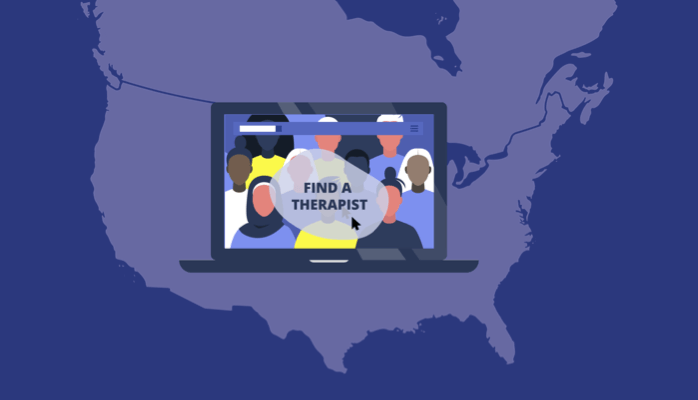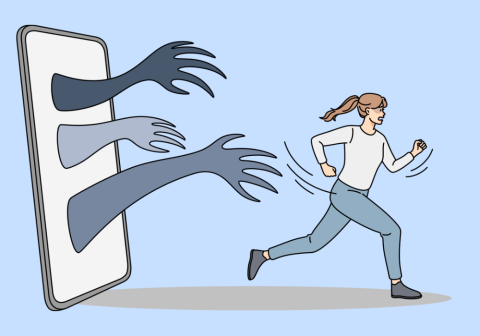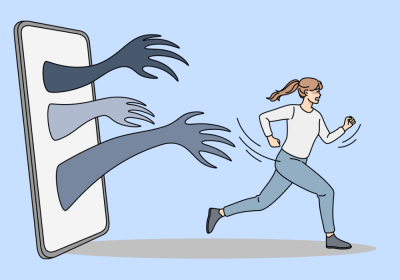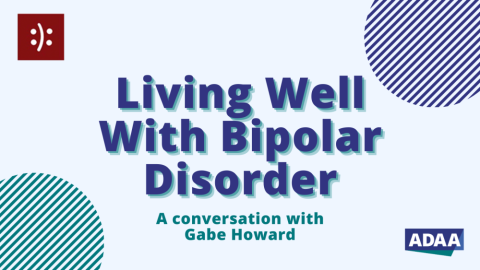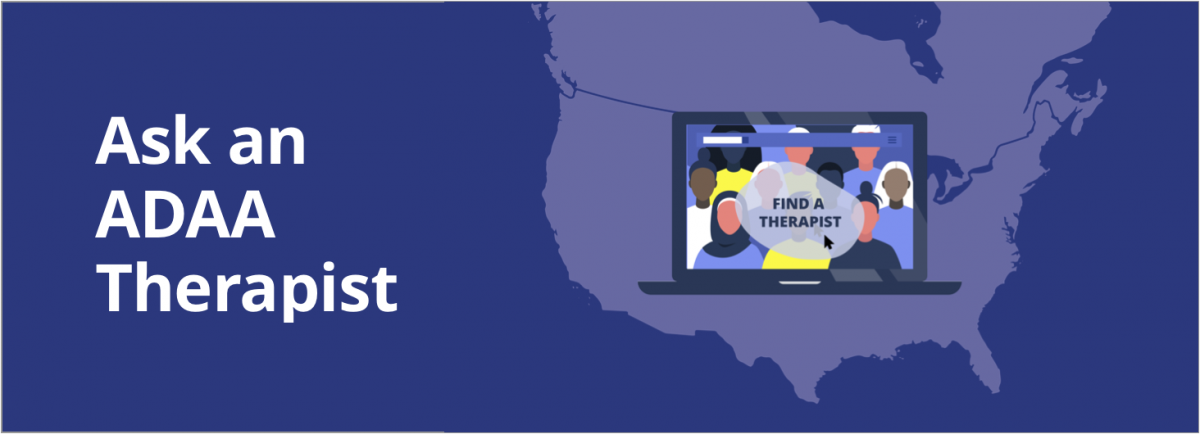
ADAA is pleased to provide a forum for FAQs that we receive from our public community. We forward all questions to one of our ADAA professional members and they respond here. We share these questions and answers on this website page, through our social media platforms and in our monthly "Ask an ADAA Therapist" e-newsletter column in our monthly issue of Triumph. Click here to submit your question.
Question: Anxiety Attacks - What Can Help? + −
I was diagnosed with general anxiety disorder about a year ago. I sought treatment and after a couple sessions was doing much better. My anxiety only comes on when I feel time pressure such as wanting to leave to get to a place on time for rational and irrational events...such as being 15 minutes away from a location and being on schedule to get there early but all of a sudden I get an anxiety attack. It feels like an elephant is on my chest and my mood changes and makes me distant. Is there a medication I can talk to my doctor about that would help relieve these sudden on set symptoms? I was prescribed beta blockers before and they did absolutely nothing for me.
Answer: ADAA member David Rosmarin, PhD, ABPP
The best medication for anxiety is Exposure Therapy. What will happen to you if you’re late and have an anxiety attack? Probably not much. Anxiety is scary, but not dangerous. So, practice facing your fears. If you’re afraid of being late, set your watch five minutes slow for two weeks. If you’re afraid of the physical feelings of anxiety, let yourself panic. And if you’re afraid of something else, like being embarrassed if others see you panic, practice feeling hot and uncomfortable (or at least pretending to) in the presence of others. Sometimes it’s possible to do these on your own, and other times it’s helpful to get support from a therapist who has experience with exposure therapy.
Question: Anxiety about Traveling Post-COVID + −
I have anxiety. I think specifically intolerance to uncertainty. I’ve put myself in a number of circumstances that make me anxious and force myself to stay present and welcome the thoughts and feelings with the hope that my brain recognizes these are not fight or flight situations. I’ve read a bunch of books. I’ve watched a bunch of CBT videos on YouTube.
Question is when we are able to travel when restrictions are lifted I am planning on driving 2000 miles from the US to Canada. I am concerned about the trip in terms of having anxiety and being able to catch my breath. I’d rather not take medications. So if I start will exposing myself to 3, 8 hour day car rides eventually subside in terms of handling the situation or will worrying about not catching my breath make this worse? Any tips or suggestions?
Answer: David Rosmarin, PhD
It's great that you are so self-aware, not only of your anxiety but the primary think causing it: Intolerance of uncertainty is at the core of most (if not all) anxiety concerns. It’s also terrific that you’ve taken steps on your own to learn about Cognitive Behavioral Therapy (CBT), and to face your fears with exposure. Indeed, by staying present with anxiety, as opposed to avoiding, we can train our minds and hearts to be more calm, centered, and collected. So, kudos to you all around! Regarding your specific question, the more in-vivo practice you can get with driving, the better off you are likely to be on that long road trip. As you practice, think long, hard, and deeply about what it would be like to have a wicked panic attack and not be able to catch your breath on the road. As I’m sure you’ve learned in your reading and video-watching about CBT, anxiety isn’t dangerous, and exposure tends to make things better, not worse. So, try to experience the fear in real-time, and get to a place of acceptance of the discomfort. Good luck and hopefully, with practice, by the time your trip comes around you’ll be able to join the ride!
Question: Is Generalized Anxiety Disorder (GAD) a lifelong ailment? + −
Is GAD a lifelong thing similar to say diabetes where you just have it for the rest of your life or is it something you develop and then can eliminate similar to lets say a drug addiction?
Answer: ADAA member Lynne Siqueland, PhD
GAD is an anxiety disorder, like the other anxiety disorders, that is highly treatable. That is once someone has an increased awareness and some education of how anxiety works, they have tools and strategies they can use when anxiety or worry arises. Some worry is a part of life. But what changes with treatment is the reaction to anxiety and worry. When people learn to be less afraid of worry when it comes up, it does not bother them much and it does not interfere with their life or enjoyment of life. Worry can be a way of approaching the world- viewing worry as necessary for control and protection and difficulty taking risks. So the real freedom from worry comes when a client works in therapy to address this change of approach. Most people then if they use these strategies and this different approach will see their worry return to lower, more normal levels. So some worry, Yes, you will have the rest of your life but not necessarily generalized anxiety disorder.
How Do I Know If I Should be on Medication for Anxiety and Depression? + −
Answer: ADAA member Dominique Apollon, MA, LPC, NCC
When it comes to medication, people usually feel one of two ways about it. There are those who are “anti-medication” and would rather do just about anything to get better without the need for a prescription and then there are those who want medication because they see it as the “magic pill” that will take care of all their problems. Before jumping to medication, I would suggest seeking a medical professional to answer any questions you may have about the process. Ideally, consulting with a mental health therapist to identify what symptoms you are presenting with can help make sense of the process ahead. The mental health professional will explore the wide range of anxiety disorders or depression severities so that you are able to better understand your symptoms and how to overcome them. ADAA also has a lot of resources that you can go through to learn more facts about anxiety and depression. Cognitive Behavioral Therapy (CBT) has been an effective component in treating anxiety disorders. Behavioral activation along with CBT can be helpful in the treatment of depression.
So, when is the right time to consider medication? I would say when you find that the anxiety or depression has become debilitating and starts to affect your ability to function. Do you find that anxiety or depression is causing strain in your relationships, or is it hard to maintain your focus at work because you are too in your head? These symptoms can affect your overall well-being, so you want to take action. Your therapist can help you find a psychiatrist, or you can contact your primary care provider to discuss medication options. Research has shown that a combination of both CBT and medication has been the most effective treatment intervention. With that being said, do note that medication is just one of the many available tools in the “anxiety toolbox.” Once you learn the skills to cope, start practicing what you have learned and implement these techniques into your daily routine you will begin to see positive changes.
Want to take the first step? Check out ADAA’s Find A Therapist tool to find a therapist near you.
Question: Can I ‘get over’ my anxiety without seeking help? + −
Answer: ADAA member Richa Bhatia, MD, FAPA
Experiencing some feelings of nervousness or worry is a normal reaction to stressors, and may even be useful in certain situations. However, if anxiety becomes excessive, pervasive, or difficult to control, and is affecting one or more areas of your life, you may be suffering from an anxiety disorder. In this case, it is important to seek help. You should also seek help, if you are unsure if your anxiety is a normal part of life or an anxiety disorder.
If you suffer from an anxiety disorder, the risks of not seeking professional help are significant. Untreated, anxiety disorders can become worse and more debilitating over time, often leading to avoidance and significant impairment in key aspects of life such as work, school, relationships and/or social functioning.
The good news is that effective, well-researched and safe treatments for anxiety disorders are available. Your doctor will first do a check-up to ensure that the anxiety is not resulting from an underlying medical problem. For the treatment of anxiety disorders, psychotherapy or medications or both, may be recommended. This recommendation is typically made in collaboration with you, taking into account the type and severity of your condition along with other factors.
Often, people are reluctant to seek help because they are concerned about cost or potential inconveniences related to treatment, or about side effects they may have heard about. If you have concerns or doubts, do discuss and clarify these with your primary care physician who can guide you in the right direction. Once you seek professional help for anxiety and have concerns or questions about a treatment option, you should not hesitate to discuss these with your treating provider. They can answer your questions, and in many cases, offer solutions that alleviate your concerns, thereby, arriving at a treatment plan that you are comfortable with.
Question: Is Participating in an online support group really helpful if you have an anxiety disorder or depression? + −
Answer: ADAA member Paul Greene, PhD
It certainly can be! But it is not a substitute for professional help.
Many people find that online support groups can be very helpful for emotional difficulties like anxiety or depression. It can be extremely comforting knowing that there are others out there who share the same problem! Another way in which online support groups can be useful is that you can learn helpful strategies there for coping with anxiety or depression. If they've worked for others, maybe they will work for you too.
However, it's important to know that anxiety disorders and depression are conditions that typically respond well to treatment. Do not mistake participating in an online group for receiving actual treatment (helpful as the groups can be). One great thing that I've seen people get from online groups is inspiration from stories of those who have overcome the same problem by seeking therapy or medication.
Unfortunately, there can be a downside to such groups. For people with obsessive compulsive symptoms, participating in the group can itself become a ritual that worsens symptoms. Also sometimes people in these groups recommend approaches or strategies that are not helpful, or strategies that have worked well for them but would be counterproductive for you. In my opinion, these disadvantages of online support groups are real limitations on how useful they are.
In summary, online support groups can certainly be helpful, but have some downsides and are no substitute for getting professional treatment.
Question: How can I support my family member with anxiety without fueling it? + −
Answer: ADAA member Andrea Umbach, PsyD, ABPP
Supporting a family member with anxiety can feel very overwhelming and confusing, as we often don’t know when to push, when to lean back, and how to be the most helpful. Many loved ones have commented they want to do whatever they possibly can for their family member with anxiety, but also feel like they are walking on eggshells and have no idea what to do.
Family accommodation is very common. Relatives are drawn into the anxiety cycle by helping perform rituals, supporting avoidance, and/or giving excessive reassurance. While our intentions are good, we make promises we can’t actually keep (“nothing bad will ever happen”), take on power we don’t have (“don’t worry, I will protect you”), and/or try to push away the problem all together (“you are fine”). While these strategies may seem supportive, they are really only a short-term fix and do not support the individual with anxiety in getting unstuck.
So what can we do? First, our loved ones with anxiety want to be heard and understood. We need to validate their experience and hear their struggle. If your spouse is really worried about losing their job or your child believes touching a doorknob an odd number of times will make him bad, we can help acknowledge how difficult this is for them (“I know this is really scary for you” or “It’s okay to feel uncertain”).
Second, we have to set reasonable boundaries around our own behaviors and support them in setting their own boundaries. By reducing accommodation in the present, they will have the opportunity to build their own skills for the future. A new program called SPACE (Supportive Parenting for Anxious Childhood Emotions) has found that behavior change in parents can have a significant impact on their child’s anxiety.
Lastly, we want to offer support in the form of encouragement. We can praise our loved ones bravery, flexibility, tolerance, acceptance, strength, and willingness to make changes. We can cheer them on when they approach hard things, exuding our confidence in their abilities and resilience (“you are strong and you can do this”).
Question: I have severe anxiety, depression and PTSD. I am 63 and currently take 0.5 mg of Ativan daily and have done so for almost 6 months. My doctor would like me to try busperidone instead. Will this drug eventually act the same as Ativan? + −
Answer: ADAA Past President Beth Salcedo, MD
For someone suffering from anxiety and depression that is not on the bipolar spectrum, bupropion would not be a typical first choice as it has proven efficacy for depression but not as much for anxiety. Typical first choices are from the SSRI category, ie Prozac, Zoloft, Lexapro and others. These are better established to treat symptoms of both anxiety disorders and depression.
Question: CBT Treatment and Anxiety + −
I have a specific anxiety question. A lot of the webinars you have published on anxiety talk about betting the anxious thoughts but not giving them any validation. For example to either ask yourself to bring it on and battle them or to play with humour and the thoughts. As I understand it the reason for this is to accept you have anxiety and the thoughts are just thoughts from that part of you. This makes sense to me if I am able to accept these thoughts.
However I am undergoing cbt at the moment and currently listing evidence for an against my fears. This feels like I am researching and is the opposite of what I should be doing.
Overall I am not losing confidence that my treatment is correct and I am wondering what are you thoughts in terms of what I should do.
Answer: ADAA Member Paul Greene, PhD
Different types of anxiety call for different strategies. Try to implement the strategies your therapist has suggested. Remember, unlike the material you'll find on the internet your therapist is offering you care based on the specifics of your situation. If you eventually feel that the strategies your therapist recommended are not working sufficiently for you, address it with him or her -- that's your best bet.
Answer: ADAA Board Member Ken Goodman, LCSW
Good question and you're right. Arguing or debating with your anxious thoughts is engagement and will take you don't the rabbit hole. Instead, respond quickly, "not taking the bait," and move on. If you're not sure about a worry, save it for therapy and discuss it with your therapist.
Question: PTSD and Ativan + −
I have PTSD due to a traumatic event that occurred in my life 3 years ago. I am 60 and never had anxiety or depression before this. I am working with a trauma specialist and am on an anti depressant, which quite frankly is not helping me. The only thing that seems to help is Ativan. Is it true that this medication cannot be used long-term? It truly is the only medication that calms me enough so that I can function and participate in life.
Answer: ADAA member Karen Martinez, MD
There are some concerns with the long-term use of Ativan (lorazepam) and other benzodiazepines such as Klonopin (clonazepam) and Xanax (alprazolam) because of the potential of addiction to these medications as well as reports of association with changes in cognitive function if used for long periods of time. I do have some patients with a variety of anxiety disorders, including PTSD, that need to use these medications in the long-term and what I do is try to keep it in the lower dose possible and continuously monitor for any sign of addiction or cognitive changes. Addiction means both physical and psychological dependence to a medication in addition to having tolerance (need to increase the dose continuously to have the same effect) and not responding to the medication at the prescribed dose. If a patient with PTSD is on a medication at the same dose for a long period of time it is not considered addiction.
Question: Irritable Bowel Syndrome (IBS) - What Can Help with the Anxiety? + −
I am suffering for IBS for a while, it passes in daily life after several weeks or months but the issue here is; I live in different town for a seven years and ı am 25 years old. After ı move to my hometown again after seven years, when ı try to spend the night in any other house except mine ı suffer from regular IBS symptoms again. Or when ı try to travel somewhere else it occurs again. I trapped in my local area this year and this cause me lose several values in my life. I’m seeking help and lacking several information about how to fix that travel and comfort issues. I’d be flattered if you help me or give any kind of advice that I can do. Thank you.
Answer: ADAA member Dominique Apollon, LPC
First off, thank you for sharing such a stressful experience. It takes incredible strength and determination to address such challenges and I applaud you for taking steps to control something that often feels so “out of our control.” Life transitions can cause us a significant amount of stress and anxiety. Stress and anxiety that manifests in our body and impacts our ability to function in certain situations or during specific interactions.
Irritable Bowel Syndrome or (IBS) can exaggerate the situational changes that we experience in our day to day life, often making it difficult to cope. According to an article published in the World Journal of Gastroenterology, IBS involves the the brain and gut, and as with anxiety, these symptoms can cause us to experience intense distress. In regards to your specific question, I would be curious to know if you have any fears about your IBS flaring up if/when you leave your home? If so, I would explore why those fears exists? Do you find yourself anticipating a flare-up prior to leaving your home? What is making you feel trapped? Accessibility to a bathroom or lack of? If so, taking actions such as doing research prior to going to a specific destination in order to reduce the fears associated with traveling. Here are 6 things I would recommend in reducing symptoms of anxiety and stress as it relates to your IBS symptoms:
- Relaxation techniques, such as progressive muscle relaxation and diaphragmatic breathing (helps allow your body to “stand down”), visualization (to help distract the mind).
- Focus on things in your control (researching acess to bathrooms, etc.)
- Mindfulness/Meditation
- Improve Sleep
- Journal to help in identifying stress, ways of managing it and documenting improvement
- Psychoeducation - learn about IBS and ways to better understand how it is effected by stress and anxiety. Here are two helpful resources:
- Overcoming Irritable Bowel Syndrome - ADAA resource
- AboutIBS.org
I hope this helps to answer your question!
Question: Can anxiety exercises make symptoms worse for people with Generalized Anxiety Disorder? + −
I recently read on an online health website that anxiety exercises, such as breathing, visualizing, and mindfulness, may actually make symptoms worse for people with Generalized Anxiety Disorder. Is this true?
Answer: ADAA Member Paul Greene, PhD
Mindfulness and relaxation training (which are similar, but are two different things) are part of standard effective treatment for generalized anxiety disorder. They are helpful for most people -- they typically do not make anxiety worse.
If you find that these exercises do not work well for you, we recommend you consult a qualified mental health professional who can help you address anxiety symptoms successfully.
Question: EMDR therapy + −
I am considering EMDR therapy for the many issues I suffer from including PTSD, anxiety and depression. Can anyone offer any insight into this procedure and the pros/cons?
Answer: ADAA Board Member Ken Goodman, LCSW
EMDR is used by many therapists for various conditions. It started as a treatment for trauma and this is what is primarily used for. It has been shown to be very affective for treating intrusive recollections of past traumas whether the trauma took place decades ago or more recently. EMDR can be conducted in a few different ways either with the eyes, ears, or touch.
Answer: ADAA Member Paul Greene, PhD
EMDR is an effective treatment for PTSD, although other types of therapy are recommended as more effective, including prolonged exposure therapy or cognitive processing therapy. In deciding which type of treatment is right for you, it's important to understand whether your PTSD is driving your anxiety and depression. If it is, choose a therapy that's been proven effective for PTSD. Consult with a mental health professional to help determine which of the problems you mentioned are the most important to address first.
Question: What is the link and differences between being a hypochondriac and suffering from health anxiety? + −
Although I can see how this specific type of anxiety was "there all along" and probably triggered out of control in 2020, can you tell me more about the link and differences between being hypochondriac and suffering from health anxiety?
Answer: ADAA Board Member Ken Goodman, LCSW
Those are two different words that mean the same thing. Hypochondria is Health Anxiety. If you found my webinars helpful and would like further assistance I would recommend The Anxiety Solution Series. It's a self-help audio program that will help with all forms of anxiety including illness anxiety. Go to QuietMindSolutions.com. Also, ADAA has a list of many self-help books on their website. Good luck and keep working hard.
Question: What is the best way to treat social anxiety and other questions about teens and social anxiety? + −
I am a 6th grader at Oswalt Academy in Walnut, CA and I have some questions for my school project on social anxiety.
Answer: ADAA Member Melanie Van Dyke, PhD
1/ What is the best way to treat social anxiety?
The great thing about social anxiety treatments is that people have several effective options: antidepressant medications and cognitive behavioral therapy. Psychologists, psychiatrists, and other medical professionals can diagnose someone with social anxiety disorder and describe treatment options to people who have issues that interfere with their daily life. Not everyone with social worries has social anxiety disorder.
2. Can social anxiety be treated at home?
Perhaps. Telehealth treatments (like virtual classes) have been successful in treating many patients, and others may benefit from reading good self-help books, focused on practicing skills.
3. Can social anxiety cause depression, or can depression cause social anxiety?
Individual patients may have issues with social anxiety, depression, or both. I’m not aware of research that confirms one causing the other, but they are related disorders and often overlap.
4. How many teens in the U.S. are affected by social anxiety?
The National Institute of Mental Health estimates that 9.1% of teens between 13-18 have social anxiety disorder—so it’s a pretty common issue. Here’s the website link:
https://www.nimh.nih.gov/health/statistics/social-anxiety-disorder#part_155902. Many teens have social concerns as they figure out their relationships. Developmentally it is normal to make mistakes when we learn new things. While no one likes to make mistakes, learning how to tolerate the silly things (that we all do and say sometimes) is key to enjoying social interactions.
5. What is the difference between social anxiety, and the other types of anxiety?
Anxiety disorders are often named for the source of the fear: social anxiety centers on fears of evaluation, panic disorder on the physiological symptoms of a panic attack, generalized anxiety disorder on general worries, and specific phobias on specific situations (such as dogs or heights).
Question: Are daily experiences and suffering considered exposure? + −
As someone who has suffered with emetophobia for twenty years, I feel nauseous nearly everyday to the point that I now fear becoming nauseous. Could this daily nausea be considered “exposure?” Why, after being exposed to it so frequently, do I still have so much anxiety around it?
Answer: Ken Goodman, LCSW
Great question - just because someone experiences something uncomfortable and unwanted day after day, doesn't mean they will acclimate to it. Their attitude and beliefs about that unwanted and uncomfortable experience play a huge part in their recovery and if they face it in the wrong way, anxiety can worsen.
In my book, The Emetophobia Manuel I go into detail about this.
Have a question for an ADAA Therapist? Click here to submit your question.
